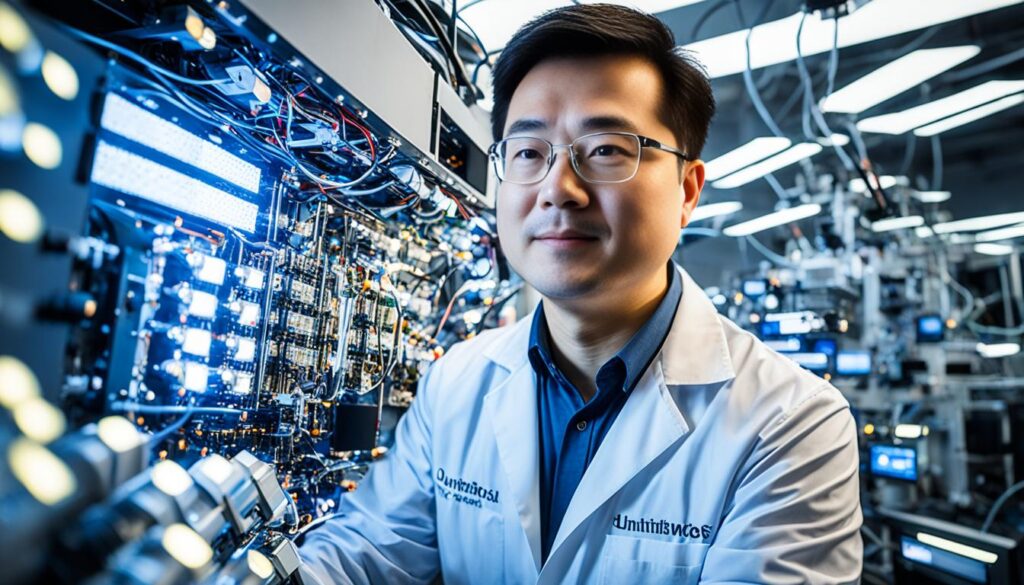Xu Yi is taking big steps in quantum computing at UVA, focusing on healthcare. At the University of Virginia, he’s turning quantum theories into real-world answers. These answers could make healthcare systems much better. Yi studies photons in quantum optics to help create new drugs. This is a big change for medical discoveries soon.
Xu Yi has earned a National Science Foundation Career Award for his work. He’s not just studying quantum mechanics. He’s making healthcare solutions that work better and can grow. Yi’s work at UVA is speeding up the creation of new drugs. This could start a big change in healthcare.
Exploring Xu Yi’s Groundbreaking Research at UVA
At the University of Virginia, Xu Yi’s work is making waves. He uses quantum optical technology to push forward in quantum computing. His efforts are inspired by Richard Feynman’s quantum mechanics ideas. He aims to use this tech for new drugs.
At UVA, Xu Yi is making big strides for medicine. He’s working to make drug development much shorter. Thanks to quantum mechanics, he might make creating new drugs quicker and better.
Xu Yi’s projects at UVA are truly forward-thinking. He takes deep dives into quantum mechanics. This aligns with Richard Feynman’s beliefs about nature. His work puts UVA at the forefront of merging quantum science with real-world health solutions. This could change healthcare for everyone, everywhere.
Impacts on Healthcare: Beyond Traditional Computing
Quantum computing is changing medicine for the better. People like Xu Yi are leading this change. They are making it easier to predict, diagnose, and treat illnesses. This isn’t just a small step. It’s a giant leap. Now, making drugs and understanding complex body chemistry is becoming everyday work.
Quantum computing plays a key role in this big change. It lets researchers understand how drug molecules behave. This means they can figure out how drugs will work faster and more accurately. It’s the start of personalized medicine. Here, treatments match a person’s genetics. This approach increases success and reduces side effects. It also makes creating new medicines faster and cheaper.
This technology could make advanced treatments available to more people. By speeding up drug development, it could lower prices. More people could get the medicines they need. This could lead to a world where new tech improves health for everyone. It could also make healthcare fairer for all.

Challenges in Scalability and Error Resilience in Quantum Computing
Quantum computing is at the forefront of technology, promising advancements in many fields. But there are big hurdles to overcome. These include the scalability challenge and achieving error resilience in quantum computing. Making progress in these areas is key to moving from theory to real-world use.
Today’s quantum systems, developed by big tech companies, face issues with scalability. These systems use superconducting circuits and must deal with quantum error correction and fault tolerance. The instability of materials at the quantum level makes errors a constant risk. This threatens the accuracy and efficiency of computations.

To tackle the scalability challenge, experts are exploring new materials and methods. Light, known for its speed and precision, offers a promising solution. By using photons to carry quantum information, researchers like Xu Yi are working toward simpler, more scalable quantum designs. Photons are less error-prone and could simplify the overall system design.
When it comes to error resilience in quantum computing, using photons could lead to more stable quantum states. This approach could also make information transfer more coherent. The stability and successful operation of quantum algorithms rely on maintaining quantum information for longer. Light’s ability to keep quantum coherence over large distances helps protect against errors.
The push towards scalable and error-resilient quantum computing is crucial. The real-world use of quantum technologies depends on scaling systems without a huge increase in errors. Progress here marks a big leap in the advancement of computing. It unlocks quantum technology’s full potential across different fields.
UVA’s Xu Yi Utilizes Light for Quantum Computing, Future for Healthcare Progress
At the University of Virginia, a big change is happening. It’s in the world of quantum computing. This change could really shake up healthcare tech. Leading this push is Xu Yi. He’s working with light to solve big problems in quantum computing. This idea started with Professor Oliver Pfister, who thought of it over ten years ago.

Yi’s work at UVA is big news. He’s making quantum computing smaller, using chips. This is a huge step. It could outdo big names like IBM in power and precision.
Yi’s work has big promises for healthcare tech. It could let us mimic complex biological systems. This could change how we make drugs and treat patients. Xu Yi’s efforts shine a light on new possibilities in healthcare.
Quantum Computing Market Projections and Its Impact on Investment
The realm of quantum computing is evolving fast, led by trailblazers like Xu Yi. With its growth, the quantum computing market attracts lots of investor and observer interest. By 2030, it’s expected to reach an impressive $65 billion.

This growth isn’t just because of breakthroughs in tech. Quantum computing aims to solve big, complex problems. These are issues classic computers can’t fix. The industry’s growth is boosted by the success of Xu Yi innovation.
Investing in quantum computing is more than just about money. It’s about leading a new era of advanced computing. Investors are not just looking for financial gain. They also want to help bring about big changes in society with quantum computing.
Towards an Integrated Quantum Computing Future
The quest for quantum supremacy is changing fast. It is becoming a reality thanks to integrated photonic platforms. Xu Yi is a key player in this field. His work in quantum technology has reached a new level. These advances are moving beyond labs and could change our daily tech.
Yi recently made a big step with 40 qumodes from one microresonator. His work brings us closer to advanced quantum systems. By putting quantum modes on chips, he tackles big challenges. This makes quantum tech less complex and dependent on many devices.
This big step has wide impacts, reaching far from just schools. Combining quantum computing with photonic platforms opens new doors. This includes more power and new markets. Xu Yi’s work moves us from big experiments to usable quantum tech. As we move towards practical quantum computing, pushing these innovations is key.
